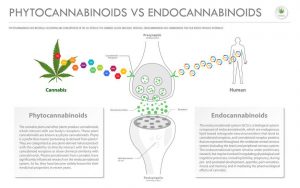CBD, or Cannabidiol, is a chemical compound extracted from cannabis that is popular in the health and wellness industry for the many benefits linked to its consumption. Used topically or ingested as an oil, CBD is an efficient and effective remedy for several health conditions. The science behind CBD’s benefits grows each day and there are an array of studies that aim to support the health proponents of the cannabinoid.
But, how does CBD work with the body, and are there any alternatives that provide similar healing properties? In this article, we outline the best CBD oil alternatives for similar health benefits in the body. We will showcase how individuals can achieve improved wellbeing without having to rely on CBD oils, a strategy that is effective for those wanting to avoid any potential consumption of trace THC, or tetrahydrocannabinol, molecules found in certain CBD-based products.
What is the Endocannabinoid System?
To understand the benefits of CBD and how to source alternative remedies for similar effects, we need to consider the primary functions that CBD plays within one’s body. All the proposed benefits of CBD are linked to its ability to interact with the body’s natural endocannabinoid system, or ECS. The ECS refers to a complex system of receptors around the body that is responsible for many bodily functions, including mood and appetite, the sleep-wake cycle, metabolic functions, stress responses, and more. The system is responsible for the regulation and maintenance of these important functions, working to support proper internal functions for a healthier and more balanced lifestyle. 
How Does CBD Affect the Endocannabinoid System?
CBD’s benefits are said to be linked to how the cannabinoid interacts with the body’s natural endocannabinoid system. Cannabinoids refer to the chemical compounds that trigger responses in the receptors composing the ECS. The body naturally produces a range of cannabinoids, however, individuals can experience the benefits of proper ECS function through the internal consumption or topical application of CBD-based products. The phytocannabinoids found in hemp and cannabis bind to receptors in the ECS and trigger neurotransmitters responsible for sending vital information around the body. This quality, and more, work to drive the numerous science-based benefits of CBD.
5 Best CBD Oil Alternatives
While CBD is one of the most popular products for improving the endocannabinoid’s functioning, there are plenty of plant-based sources that contain phytocannabinoids responsible for providing similar benefits to the cannabis-based product. Below, we take a look at the best CBD oil alternatives that deliver similar health benefits.
Ginger Root
Ginger root is one of the most accessible plant-based remedies that has been used for centuries for its numerous health benefits. Individuals can find the root at most local supermarkets and can purchase it whole or pre-skinned and chopped. Ginger root consumption is popular for its ability to enhance the flavor of a dish as well as the anti-inflammatory and antioxidant properties it possesses. The root has also shown signs that it can relieve pain, specifically among individuals suffering from arthritis as outlined in authority sources.
Magnolia Bark
Magnolia bark has become an essential ingredient in the best healthcare and supplements products on the market for the ample health benefits in its consumption. Beyond improving overall wellbeing, magnolia bark is becoming a popular CBD oil alternative for its ability to relieve anxiety. Studies highlight that subjects who received 250mg of magnolia bark reported a measurable difference in anxiety levels when compared with subjects who received a placebo. The anxiety-relieving properties of magnolia bark may be an ideal result for those searching for CBD oil alternatives.
Clove Oil
Clove oil contains similar components to CBD, particularly beta-caryophyllene, a terpene. The dietary cannabinoid fights depression and anxiety by targeting specific receptors in the ECS. Some individuals have also noted its ability to reduce pain, specifically those suffering from tooth pain.
Peony
Another plant found in the best supplements and healthcare products on the market, Peony is a powerful natural remedy high in cannabinoids responsible for supporting the ECS. The plant is primarily ingested to regulate receptor pathways linked to Exertional Compartment Syndrome which leads to pain, swelling, and other mobility restricting effects. The plant’s ability to fight inflammation and reduce muscle spasms makes it a positive alternative to traditional CBD-based products.
Echinacea
Echinacea has and is still used to combat the symptoms of the common cold. Its ability to reduce pain in the throat as well as remedy a cough are the primary reasons for the consumption of the plant. That said, more and more individuals are noting the pain-relieving and inflammation-fighting properties of the cannabinoid-rich plant.
There are many ways to improve one’s endocannabinoid system beyond CBD-based products to live a healthier and happier life. Through the consumption of plant-based sources high in phytocannabinoids, such as clove oil and magnolia bark, individuals can experience the benefits of CBD through the best CBD oil alternatives.

